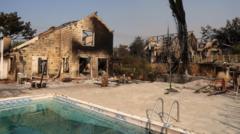Iliescu, a controversial leader who transitioned the nation from communism to democracy, left behind a mixed legacy filled with achievements and scars of violence.
Ion Iliescu: Reflecting on a Divisive Figure in Romania's Democratic Journey

Ion Iliescu: Reflecting on a Divisive Figure in Romania's Democratic Journey
The death of Romania's first post-communist president, Ion Iliescu, ignites debate about his complex legacy.
Iliescu's death on August 5 at age 95 signals the closing chapter of a figure whose life mirrored Romania's broader struggle for identity in a post-communist world. With roots in the tumult of the December 1989 revolution that dismantled Nicolae Ceausescu's regime, Iliescu became a titular hero, praised for guiding the nation towards democratic infrastructure and integration with NATO and the EU. However, his leadership was marred by incidents that haunt the national memory, including the 1990 protests suppression which escalated into violent episodes known as the Mineriads.
Teodor Tita, a prominent political analyst, emphasizes that Iliescu's legacy is complex. Described neither as a hero nor a villain, he encapsulated the paradoxes inherent in Romania's pursuit for democracy while grappling with a shadowy past. Born in 1930 in Oltenita, Iliescu studied engineering in the Soviet Union during Stalin's reign, which raised suspicions about his loyalties. Upon returning to Romania, he held several influential roles within the Communist Party, eventually becoming a reformist adversary of Ceausescu's hardline government.
After re-emerging in 1989 as a visible leader during the revolution, Iliescu’s National Salvation Front held considerable power in the chaotic aftermath. Though initially celebrated, his presidency soon faced criticism as real power dynamics resurfaced, with corrupt elements from the communist era persisting. Analysts highlight how his inaction on reforming the justice system allowed systemic corruption to proliferate.
Elected president three times, his tenure spanned critical transitions, yet he remains under scrutiny for not fully addressing human rights abuses. In 2017, Iliescu faced legal challenges regarding his involvement in violence during the early 1990s, reflecting ongoing debates about accountability and justice.
Post-presidency, he stepped back from public life but retained influence within the Social Democratic Party, although his controversial actions and policies continue to spark debate among historians and political commentators. His role in establishing Romania's democratic framework is acknowledged, yet the scars of his governance leave behind a polarized legacy—balancing progression with entrenched disputes—echoing the struggles of a nation finding its place in the modern world.
Teodor Tita, a prominent political analyst, emphasizes that Iliescu's legacy is complex. Described neither as a hero nor a villain, he encapsulated the paradoxes inherent in Romania's pursuit for democracy while grappling with a shadowy past. Born in 1930 in Oltenita, Iliescu studied engineering in the Soviet Union during Stalin's reign, which raised suspicions about his loyalties. Upon returning to Romania, he held several influential roles within the Communist Party, eventually becoming a reformist adversary of Ceausescu's hardline government.
After re-emerging in 1989 as a visible leader during the revolution, Iliescu’s National Salvation Front held considerable power in the chaotic aftermath. Though initially celebrated, his presidency soon faced criticism as real power dynamics resurfaced, with corrupt elements from the communist era persisting. Analysts highlight how his inaction on reforming the justice system allowed systemic corruption to proliferate.
Elected president three times, his tenure spanned critical transitions, yet he remains under scrutiny for not fully addressing human rights abuses. In 2017, Iliescu faced legal challenges regarding his involvement in violence during the early 1990s, reflecting ongoing debates about accountability and justice.
Post-presidency, he stepped back from public life but retained influence within the Social Democratic Party, although his controversial actions and policies continue to spark debate among historians and political commentators. His role in establishing Romania's democratic framework is acknowledged, yet the scars of his governance leave behind a polarized legacy—balancing progression with entrenched disputes—echoing the struggles of a nation finding its place in the modern world.



















